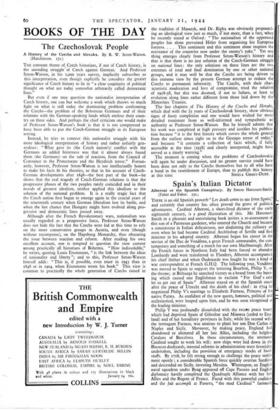BOOKS OF THE DAY
The Czechoslovak People
A History or the Czechs and Slovaks. By R. W. Seton-Watson. (Hutchinson. iss.) THE constant theme of Czech historians, if not of Czech history, is the unending struggle' of Czech against German. And Professor Seton-Watson, in his r,000 years survey, implicitly subscribes to this interpretation, even though explicitly he considers the greater significance of Czech history to lie in " a clear continuity of political thought on what are today somewhat arbitrarily called democratic lines."
But even if one may question the nationalist interpretation of Czech history, one can but welcome a work which throws so much light on what is still today the dominating problem confronting the Czechs—the problem of the Bohemian Germans and of their relations with the German-speaking lands which enclose their coun- try on three sides. And perhaps the chief criticism one would make of Professor Seton-Watson's book is that it is too compressed to have been able to put the Czech-German struggle in its European setting.
Instead, he tries to connect this nationalist srtuggle with his more ideological interpretation of history and rather unfairly gen- eralises : " What gave its (the Czech nation's) conflict with the Germans an added bitterness was that it almost always found them (the Germans) on the side of reaction, from the Council of Constance to the Protectorate and the Heydrich terror." Fortun- ately, however, Professor Seton-Watson is too intellectually honest to make his facts fit his theories, so that in his account of Czech- German developments after 1848—the best part of the book—he shows that the real tragedy of Czech-German relations is that the progressive phases of the two peoples rarely coincided and in their moods of greatest idealism, neither applied this idealism to the solution of the national problem. It is a really tragic fact that the Czech nation first began to emerge again in the crucial years of the nineteenth century when German liberalism lost its battle, and when the last chance that Hungary might have evolved along pro- gressive and democratic lines passed away.
Although after the French Revolutionary wars, nationalism was usually regarded as a progressive force, Professor Seton-Watson does not hide the fact that the Czechs were led at this time to rely on the more conservative groups in Austria, and even (though without recompense), on the Hapsburg Monarchy, thus obscuring the issue between reaction and reform. After reading his own excellent account, one is tempted to question the view current among practically all historians of Bohemia. " How indissoluble," he writes, quoting Louis Eisenmann, " is the link between the ideas of nationality and liberty "; - and to this, Professor Seton-Watson himself adds : " This is, if possible, even truer in 1943 than in 1848 or in 1904, when Eisenmann wrote his book." This view is common to practically the whole generation of Czechs raised in the tradition of Masaryk, and Dr.. Ripka was obviously propound- ing an ideological view just as much, if not more, than a fact, 'when he recently stated at Oxford : " The nationalism of the oppressed peoples has alone prevented Hitler from organising his European fortress. . . . This sentiment and this sentiment alone inspires the resistance of the countries now under the enemy's yoke." Yet one thing emerges clearly from Professor Seton-Watson's history and that is that there is no just solution of the Czech-Germaii struggle on national lines : the only solutions on these lines are the two extremes of total and final domination by one or other national groups, and it may well be that the Czechs are being driven to this extreme view by the present German attempt to reduce the Czechs to permanent inferiority. The Czechs, with their char- acteristic moderation and love of compromise, tried the solution of 1918-38, but this was doomed, if not to failure, at least to evolution along lines rather different from those laid, down by the Minorities Treaties.
The last chapters of The History of the Czechs and Slovaks, which deal with the 25 years of Czechoslovak history, show obvious signs of hasty completion and one would have wished for more detailed treatment from so well-informed and sympathetic an authority as Professor Seton-Watson. But he himself admits that his work was completed at high pressure and justifies his publica- tion because " it is the first history which covers the whole ground from the earliest times right on to the Gestapo terror of today," and because " it contains a collection of facts which, if fully accessible at the time (1938) and clearly interpreted, might have served as a timely warning."
The moment is coming when the problems of Czochoslovakia will again be under discussion, and no greater survice could have been done not only to the Czechs themselves but to all who have a hand in the resettlement of Europe, than to publish this history


























 Previous page
Previous page